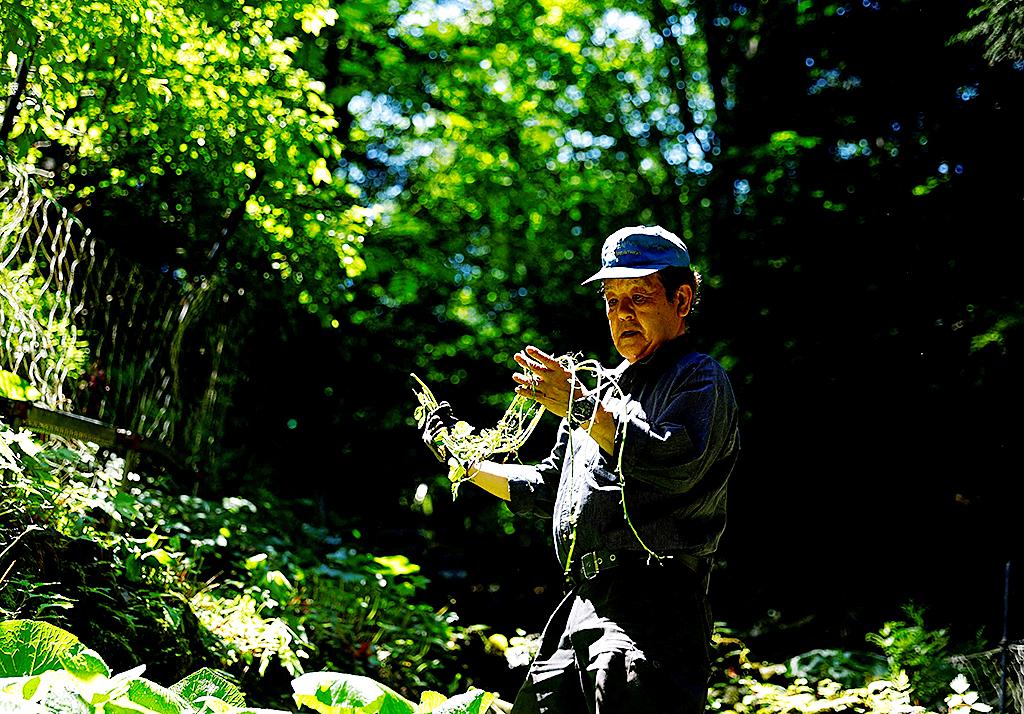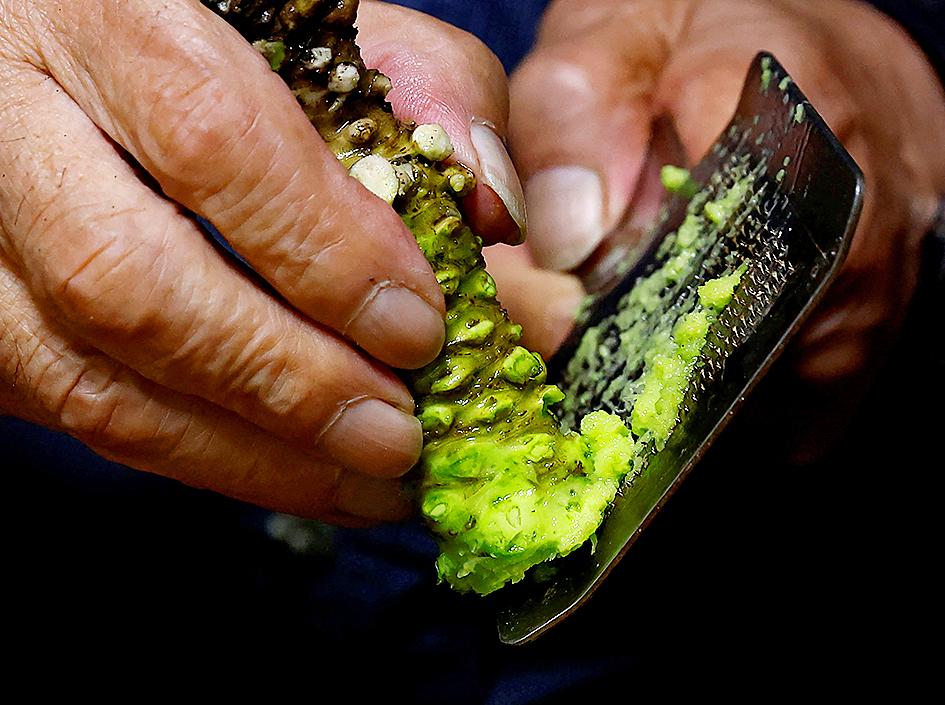Masahiro Hoshina, a Japanese farmer, starts worrying about typhoon season months before it begins, haunted by memories of the heavy rains and landslides that washed away wasabi farms during one 2019 storm.
“Recently the power of typhoons feels totally different from before due to global warming. It’s getting stronger,” said the 70-year-old farmer in Okutama, west of downtown Tokyo.
“Since it’s happened once, there’s no guarantee it won’t happen again.”

Photo: Reuters
Wasabi, the tangy Japanese horseradish that’s an essential part of sushi and dabbed onto slices of raw fish or into bowls of soba buckwheat noodle soup, is usually grown along streams in narrow valleys, leaving farms prone to disasters.
Typhoon Hagibis, which slammed into eastern Japan in 2019, slashed production in Okutama by nearly 70 percent the next year. The need for replanting and careful tending meant it’s taken nearly three years for sushi farms there to recover.
Experts say global warming is affecting production not only by increasing the number and severity of storms, but with rising temperatures that threaten growth of the plants, which need to be in water a consistent 10-15 degrees Celsius year-round.

Photo: Reuters
A lack of wasabi could also endanger traditional Japanese foods such as sushi and sashimi, where the tang of the wasabi is used as a contrast with raw fish.
Weather isn’t the only obstacle wasabi farmers face. A drop in rural populations due to aging means there are no successors. Because of the two factors, the output of wasabi grown in clear-flowing water, like at Hoshina’s farm, had fallen to half that of 2005, according to the Agriculture Ministry.
Norihito Onishi, head sales manager at a chain of soba buckwheat noodle restaurants called Sojibo, has seen his business directly affected by wasabi shortages and supply problems.
The restaurants were long known for allowing customers to grind their own wasabi roots to produce the spicy paste used as a condiment for soba. But they’ve had to mostly give this up.
“In the past, we served all the cold soba noodles with a piece of raw wasabi, but now we can no longer do that,” Onishi said.
Though wasabi root was plentiful when the restaurant first opened 30 years ago, Onishi said over the last 5 to 10 years there have been times when he couldn’t get any at all. The precious root is now made available only for certain types of dishes.
“If this unstable supply of wasabi persists, due to many factors including global warming, we will face a situation where we need to come up with other ways to overcome the problem so we don’t end up not serving raw wasabi at all,” said Onishi.

Dissident artist Ai Weiwei’s (艾未未) famous return to the People’s Republic of China (PRC) has been overshadowed by the astonishing news of the latest arrests of senior military figures for “corruption,” but it is an interesting piece of news in its own right, though more for what Ai does not understand than for what he does. Ai simply lacks the reflective understanding that the loneliness and isolation he imagines are “European” are simply the joys of life as an expat. That goes both ways: “I love Taiwan!” say many still wet-behind-the-ears expats here, not realizing what they love is being an

Google unveiled an artificial intelligence tool Wednesday that its scientists said would help unravel the mysteries of the human genome — and could one day lead to new treatments for diseases. The deep learning model AlphaGenome was hailed by outside researchers as a “breakthrough” that would let scientists study and even simulate the roots of difficult-to-treat genetic diseases. While the first complete map of the human genome in 2003 “gave us the book of life, reading it remained a challenge,” Pushmeet Kohli, vice president of research at Google DeepMind, told journalists. “We have the text,” he said, which is a sequence of

Every now and then, even hardcore hikers like to sleep in, leave the heavy gear at home and just enjoy a relaxed half-day stroll in the mountains: no cold, no steep uphills, no pressure to walk a certain distance in a day. In the winter, the mild climate and lower elevations of the forests in Taiwan’s far south offer a number of easy escapes like this. A prime example is the river above Mudan Reservoir (牡丹水庫): with shallow water, gentle current, abundant wildlife and a complete lack of tourists, this walk is accessible to nearly everyone but still feels quite remote.

It’s a bold filmmaking choice to have a countdown clock on the screen for most of your movie. In the best-case scenario for a movie like Mercy, in which a Los Angeles detective has to prove his innocence to an artificial intelligence judge within said time limit, it heightens the tension. Who hasn’t gotten sweaty palms in, say, a Mission: Impossible movie when the bomb is ticking down and Tom Cruise still hasn’t cleared the building? Why not just extend it for the duration? Perhaps in a better movie it might have worked. Sadly in Mercy, it’s an ever-present reminder of just